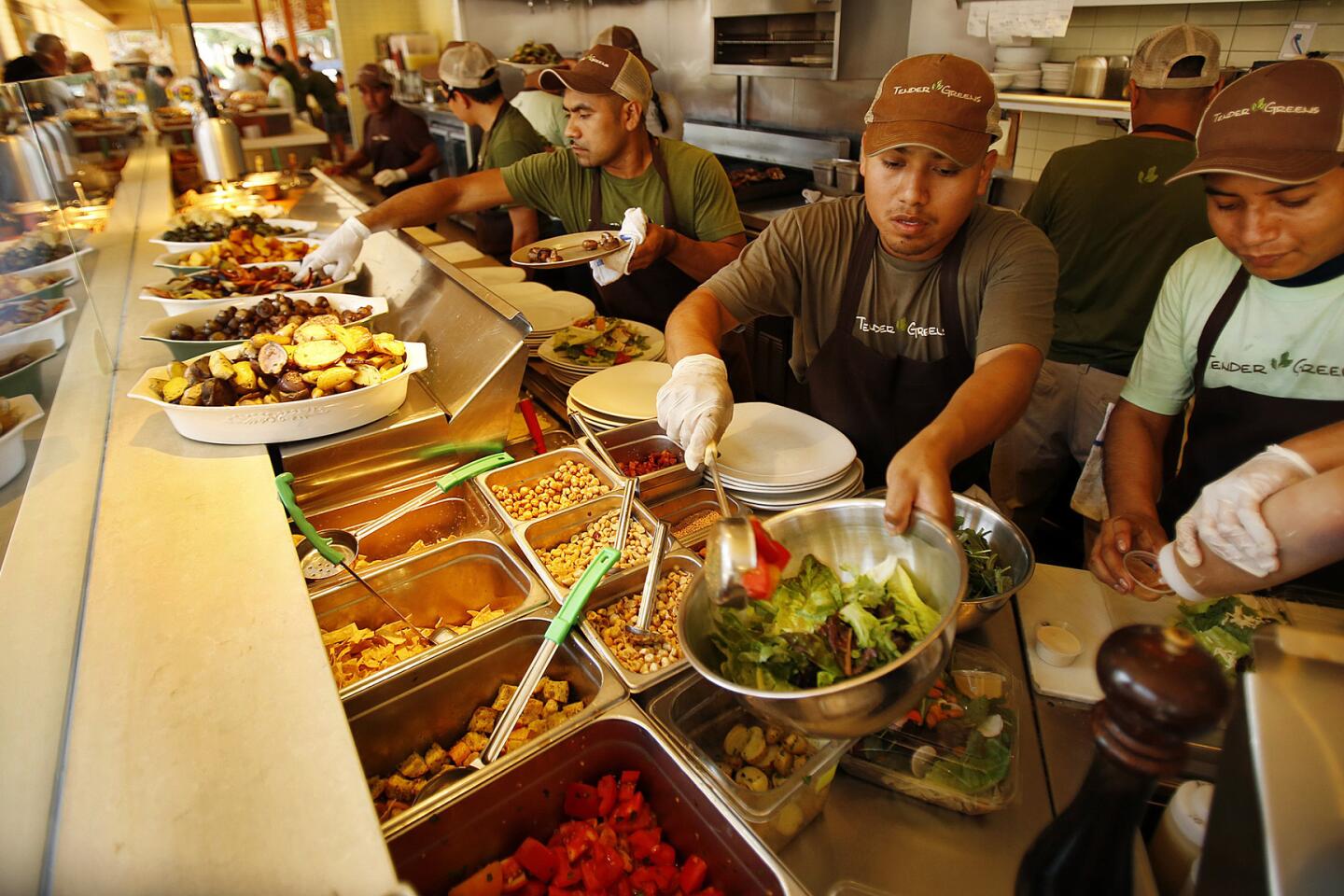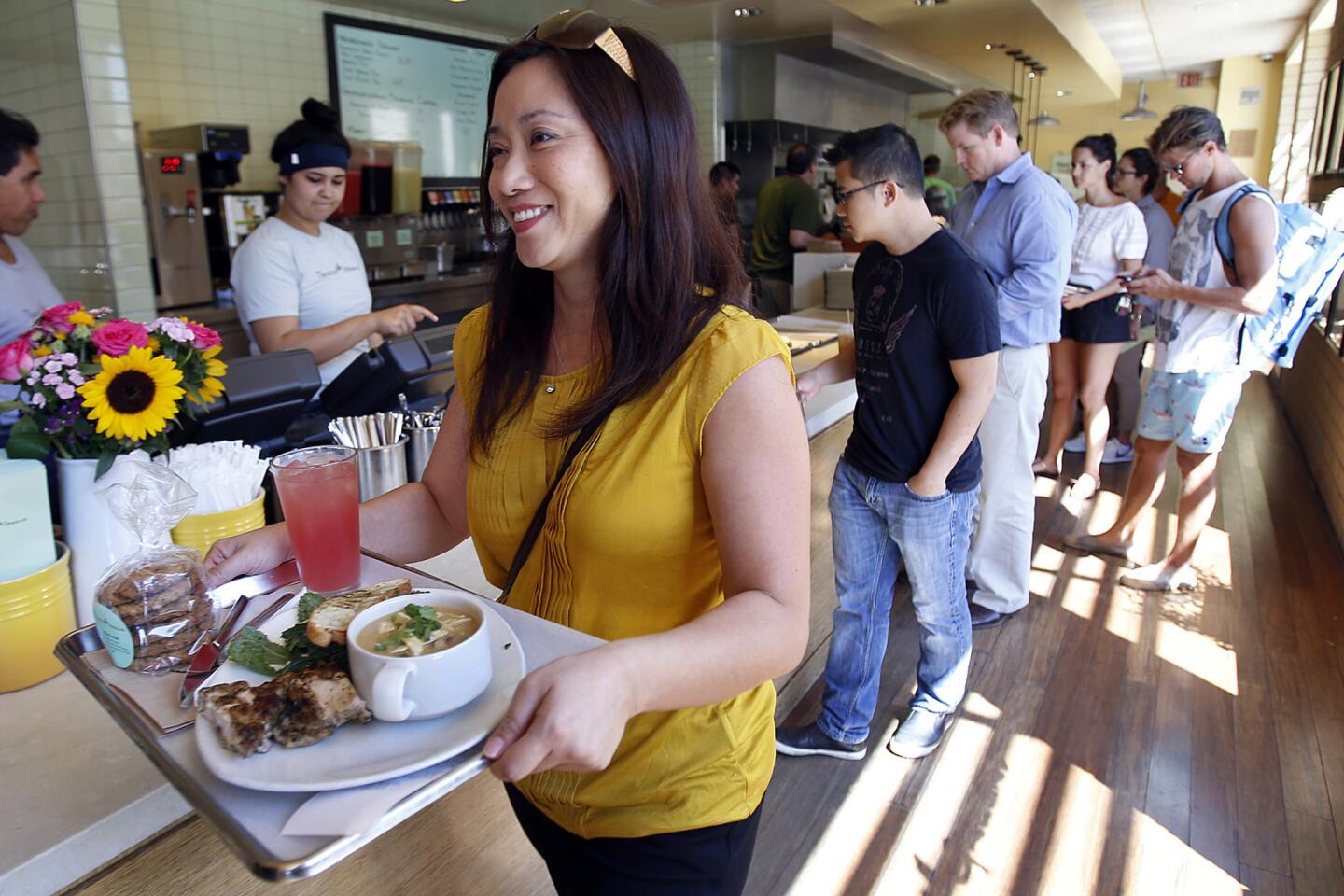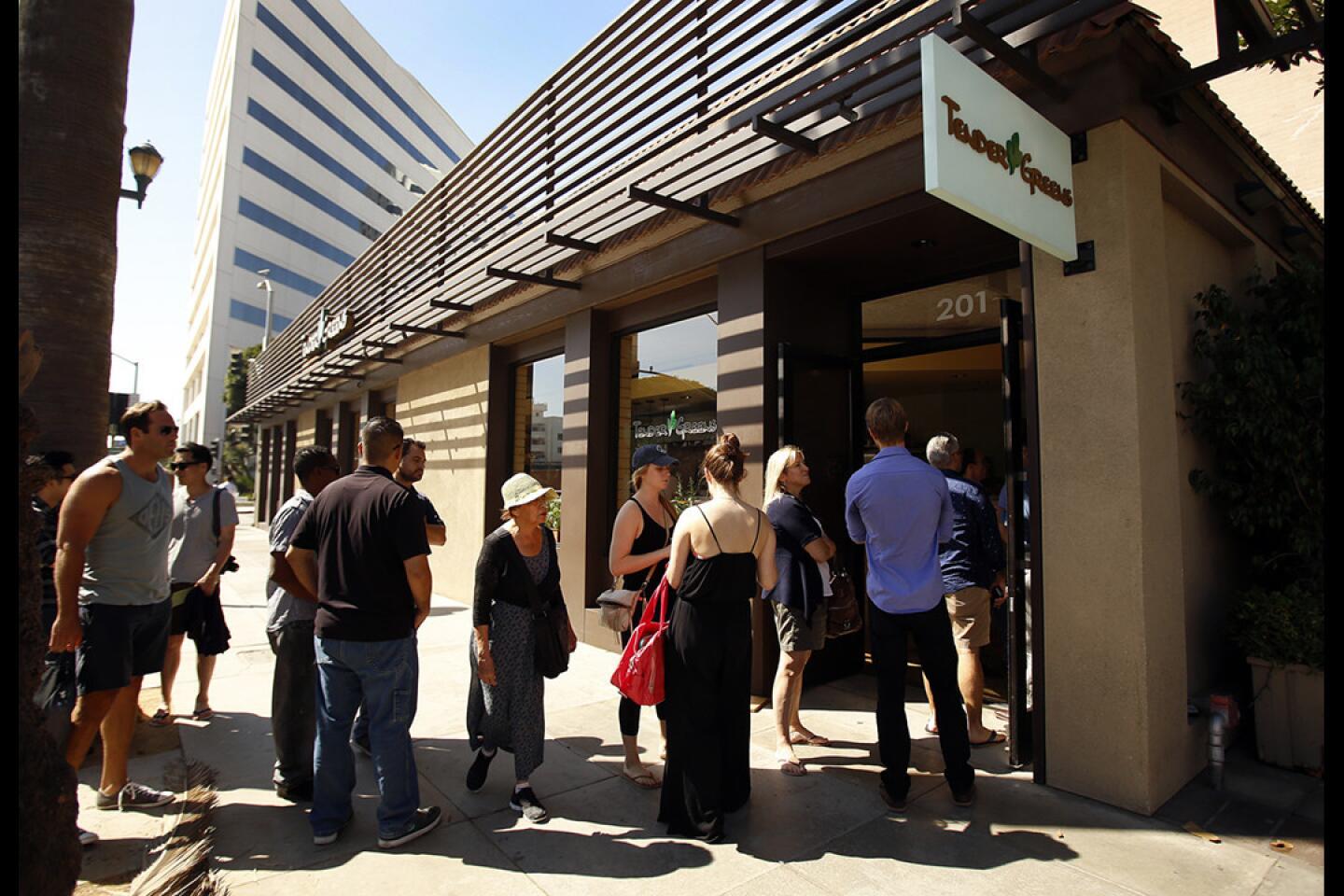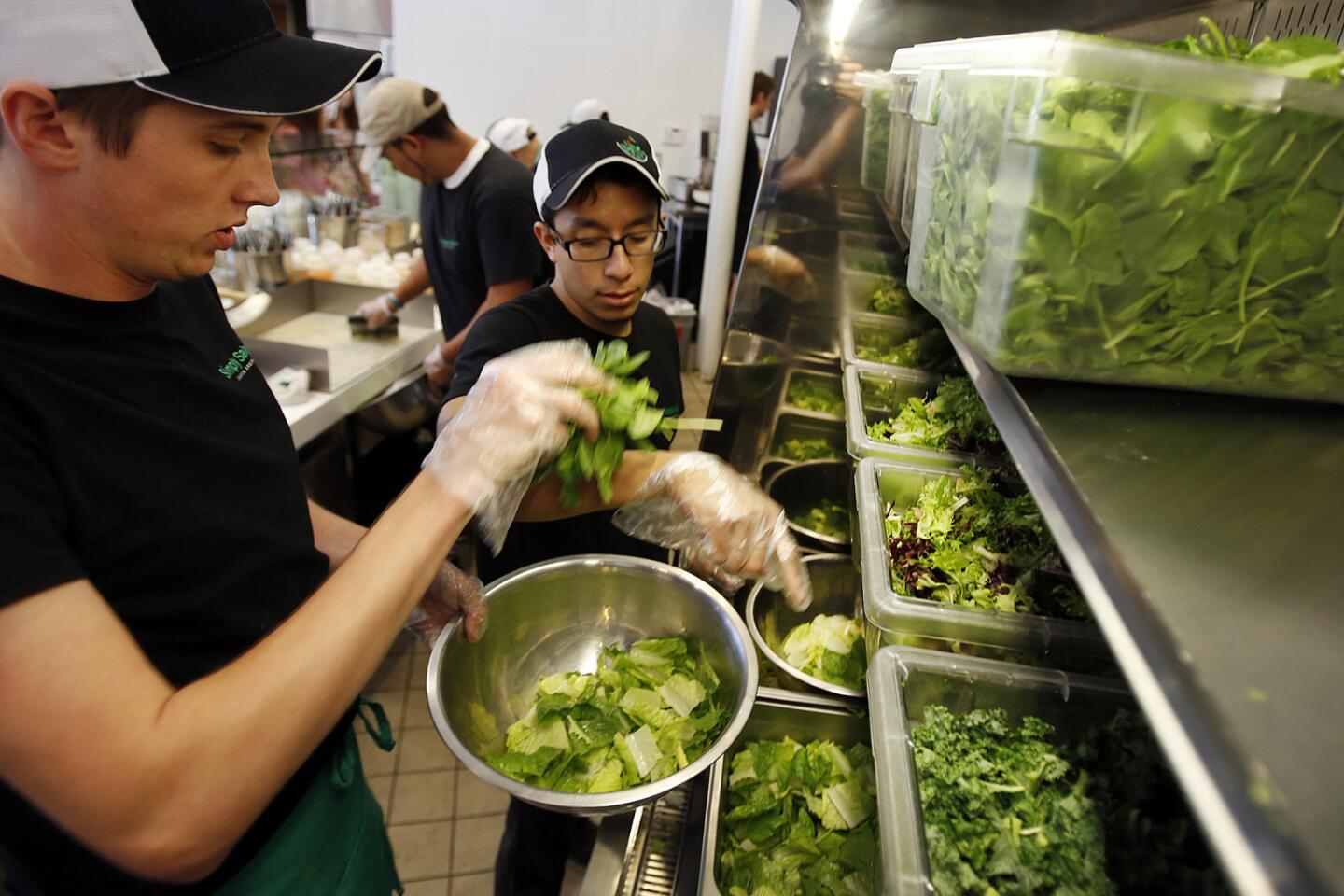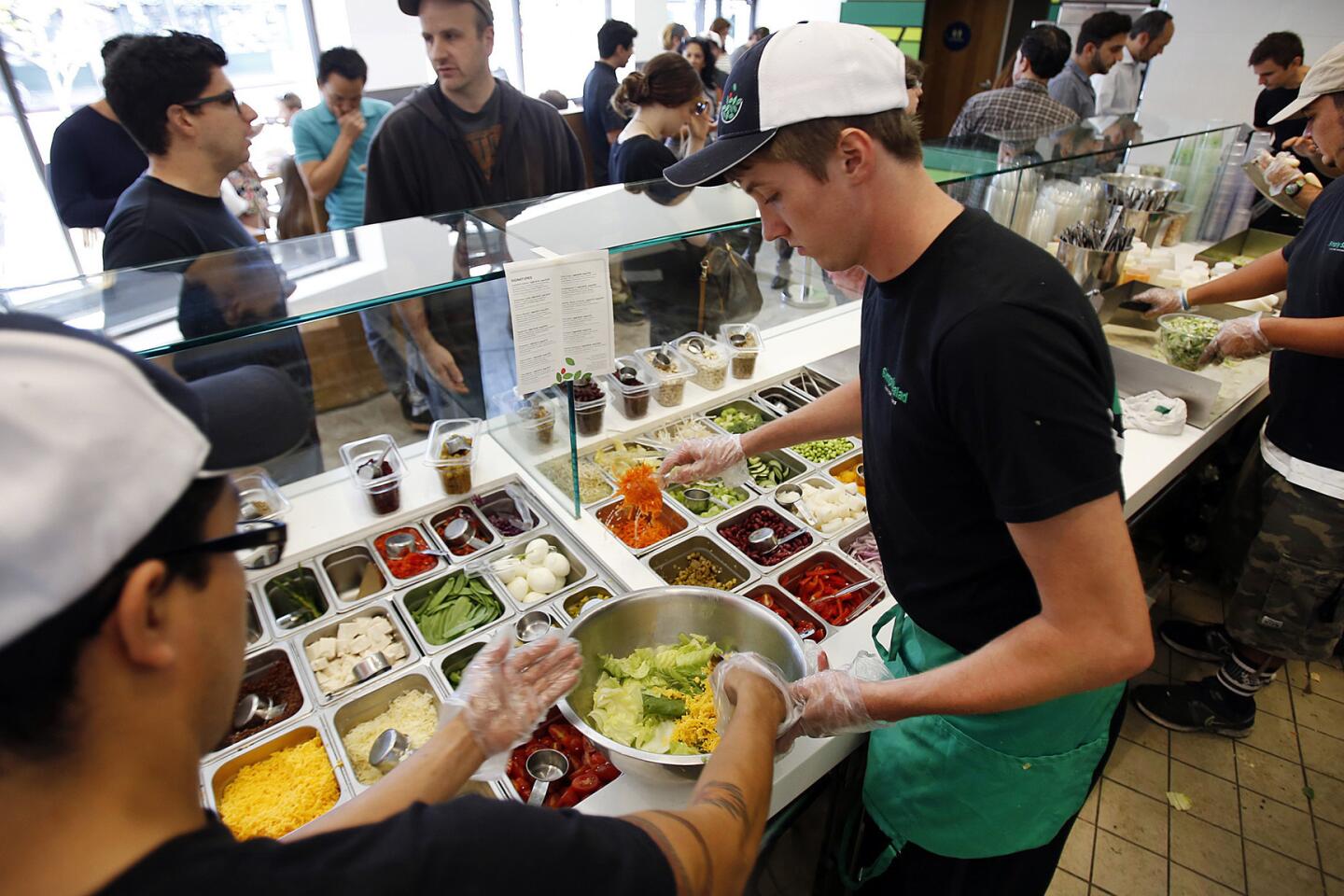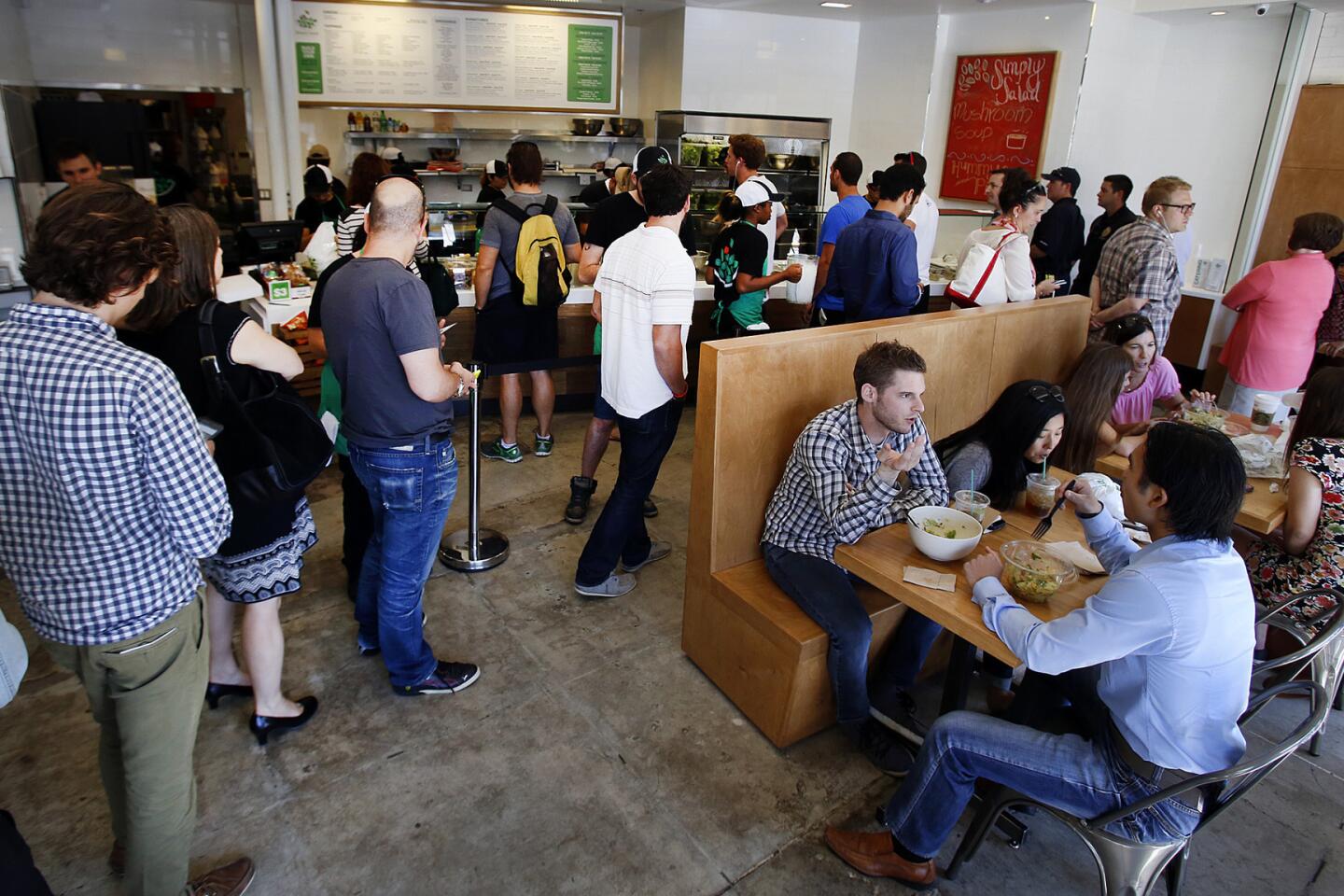Bye-bye, burgers: New fast-food chains bet on healthy eating
Some of the fastest-growing fast-food chains aren’t slinging artery-clogging cheeseburgers or cooking up calorie-packed fried chicken.
Instead, diners can order Brussels sprouts salads and kale smoothies, served with the same speed as In-N-Out or Burger King.
America’s interest in locally sourced and healthy foods has spurred a boom in farmers markets and farm-to-table restaurants and has expanded organic produce at the supermarket. Now, a number of upstart chains trying to tap that interest are taking aim at traditional fast food by moving leafy greens and fruits to the center of the plate.
These rapidly expanding restaurants want to revolutionize the fast-food industry, bringing healthy fare to the masses who typically don’t shop at Whole Foods. At the same time, they are stealing customers from stalwarts such as McDonald’s.
These chains, several based in California, see a juicy opportunity in the Golden State, with its bounty of health-obsessed diners interested in the latest food fads.
Such chains make up just a tiny fraction of the $200-billion fast-food industry in the United States. But analysts predict this sector will boom as health-conscious consumers ditch the burger and fries in favor of quickly prepared healthy meals.
“The most bankable word in food service is fresh,” said restaurant consultant Aaron Allen.
Many are rethinking the fast-food experience beyond food. At some, you’ll find real china replacing paper dishes and foam cups for in-house eating. There are cushy chairs and communal tables, not plastic ones that are nailed down. Several offer beers from local breweries and menus that change with the seasons.
“People want to eat more vegetables that are nutritious and unprocessed,” said Greg Dollarhyde, chief executive of Santa Monica-based chain Veggie Grill. “The big trend now is make it better for me, but I don’t want to give any flavors up.”
Many of these restaurants cater to salad skeptics or meat lovers who shy away from anything green or overly healthy.
“I don’t like saying the H word because that’s going to turn people off,” said Mike Donahue, co-founder of Lyfe Kitchen, which has expanded to 13 locations since opening its first restaurant in Palo Alto in 2011. “I tell our people they have got to start every message with, ‘Tastes great, tastes great, tastes great. And oh, by the way, it is good for you.’”
Lyfe Kitchen serves burgers with grass-fed beef and decadent chocolate desserts, all under 600 calories. Donahue said the company avoids pushing the uber-healthy aspects of its dishes — focusing on the tastiness of its kale banana smoothies, for instance, instead of highlighting the kale.
Even Veggie Grill, which offers only vegetarian food, sells meatless cheeseburgers and chicken wings to entice “recovering carnivores,” Dollarhyde said.
The popularity of chains that offer quick yet healthy meals is driven by millennials who grew up watching the Food Network and aging baby boomers who want to maintain their health.
“Younger consumers eat out a lot, and they don’t want to feel bad about their choices every day,” said Kelly Weikel, senior consumer research manager at Technomic Inc., a food industry consulting firm. “Eating healthy is also appealing for boomers. When they eat out, they go for a little bit healthier because they are trying to preserve their vitality.”
Zsofi Paterson, 29, said she avoids traditional fast-food joints and used to depend on sushi and the salad bar at Whole Foods for quick meals. The corporate advisor from Santa Monica said she dines at least once a week at chains such as Simply Salad or Tender Greens.
“I like getting something tasty and not greasy and horrible for you,” Paterson said. “You can also sit down because it’s an actual restaurant.”
Several of the healthy chain founders did time at conventional eateries. Donahue of Lyfe Kitchen logged two decades at McDonald’s. The three founders of Tender Greens met while working at the luxurious Shutters on the Beach in Santa Monica, where two served as chefs.
“We wanted to find a balance between the very expensive but very good restaurant world we spent our careers in, and the mom-and-pop cheap eats that we could afford but weren’t really in line with our lifestyle,” said Erik Oberholtzer, chief executive of Tender Greens.
Although McDonald’s and other chains have been trying to increase their healthy offerings, many of their menu items remain laden with calories, saturated fat and sodium.
For example, the popular McDonald’s double cheeseburger weighs in at 430 calories, 10 grams of saturated fat and 1,040 milligrams of sodium. A small order of fries adds 230 calories, 1.5 grams of saturated fat and 130 milligrams of sodium.
Lyfe Kitchen sells a grass-fed beef burger with 544 calories, 8 grams of saturated fat and 635 milligrams of sodium. But those watching their figures can opt for the marinated kale at a svelte 68 calories, 1 gram of fat and 74 milligrams of sodium. The quinoa crunch bowl contains 552 calories, 3 grams of saturated fat and 551 milligrams of sodium.
Cost is another difference. The double cheeseburger is a stalwart on McDonald’s Dollar Menu; nothing is that cheap at the chains that promote themselves as health centered.
High-quality ingredients can pose a challenge for these chains, which need to find reliable suppliers while quickly expanding.
Tender Greens operates 17 locations, all in California. It so far has partnered with Scarborough Farms in Oxnard for most of its produce.
Now with an eye toward eventually expanding outside the Golden State, the Culver City chain plans to experiment with modern farming techniques that will enable it to grow food in indoor spaces such as abandoned industrial buildings.
“That will allow us to not only scale up but also to scale our produce, take it on the road, and bring the farm with us,” Oberholtzer said.
These quick health-food spots are finding strong demand for not only finer ingredients but also extra dining frills that add to the overall experience.
At Lyfe Kitchen, which plans to open up to 20 locations next year, waiters deliver meals; diners order at the counter and then are handed a GPS device so they can be easily located inside the restaurant. Food is served on real china with flatware and glasses.
Sweetgreen, which is opening in West Hollywood and Santa Monica next year, has branched outside of restaurants by throwing an annual music and food festival called SweetLife.
Co-founder Nathaniel Ru said Washington, D.C.-based Sweetgreen is working to improve its app so customers can order food as well as pay for meals on their mobile devices. Frequent app users are invited to enjoy perks such as special dinners and festival tickets.
The entrepreneurs behind healthy fast food say they are confident that diners will be eager to pay slightly more for good meals that are easy on the arteries.
“What you saw in the past with fast food was all convenience,” said Cameron Lewis, co-founder of Simply Salad. “Now we can make healthy, good-quality food in the same time as your typical fast-food experience.”
He and partner Bruce Teichman opened their first Simply Salad in 2010 after emptying out their savings accounts. In August, their third location opened in Santa Monica.
They plan to add five restaurants in the L.A. area in the next two years and then take on the rest of the state and beyond. The restaurants have thrived, especially with diners who want to get in and out in less than 30 minutes without downing a burrito or burger.
“If you want to go to McDonald’s or Burger King, obviously feel free,” Teichman said. “But you get what you pay for.”
Twitter: @ByShanLi
More to Read
Inside the business of entertainment
The Wide Shot brings you news, analysis and insights on everything from streaming wars to production — and what it all means for the future.
You may occasionally receive promotional content from the Los Angeles Times.
